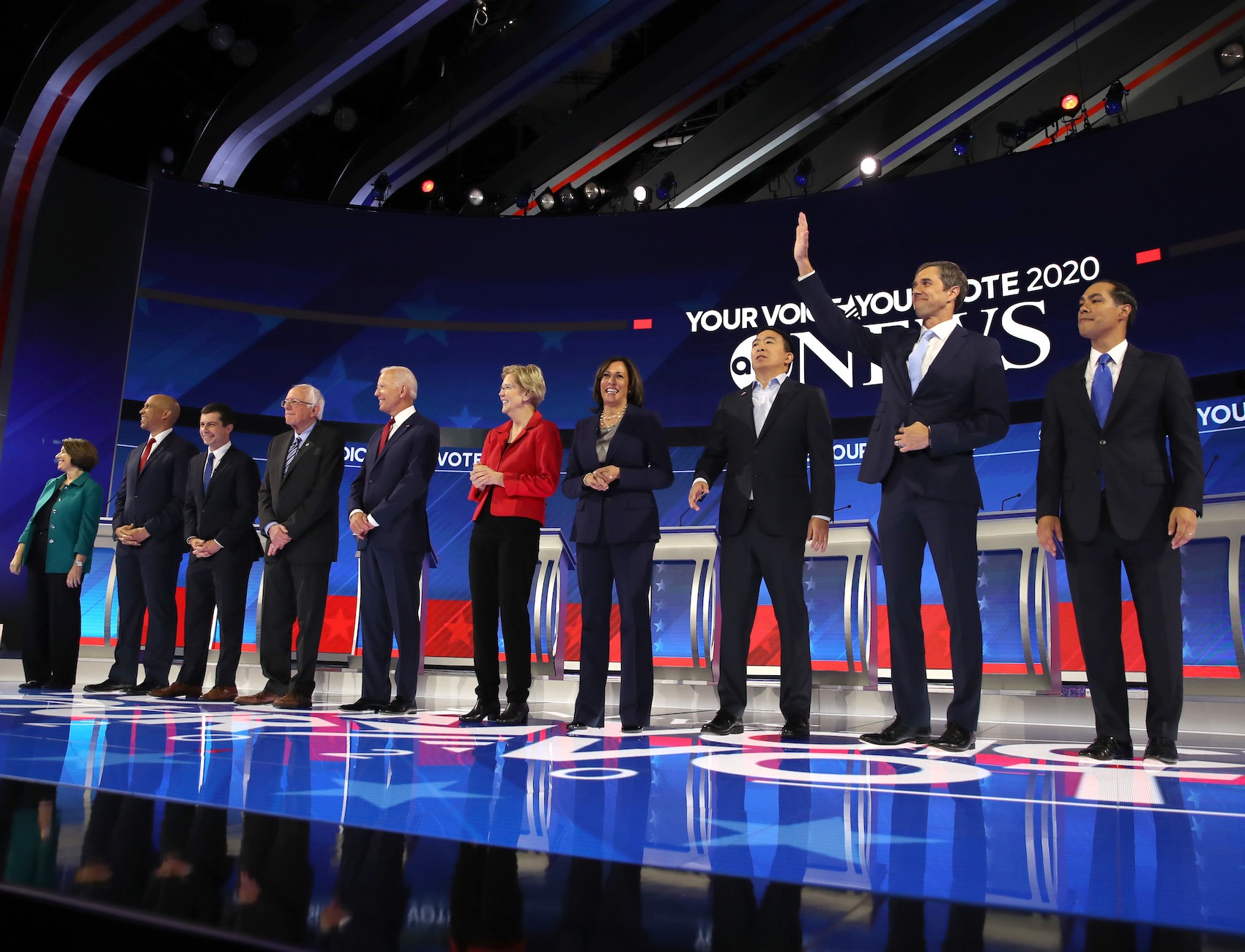In Third Debate, Democratic Presidential Candidates Condemn Mass Incarceration Without Naming Its Main Driver
Candidates offered reforms for people accused of low-level, nonviolent offenses, but more than half of U.S. prisoners have committed a violent crime.

During the third Democratic presidential debate in Houston on Thursday night, the candidates seemed to agree: Mass incarceration must be addressed. Too many people are serving long sentences in prison for low-level, nonviolent offenses and drug crimes, or are being unjustly imprisoned and losing their right to vote, several White House contenders said.
“Nobody should be in jail for a nonviolent crime … nobody should be in jail for a drug problem,” said former Vice President Joe Biden, the current frontrunner.
But no candidate on the debate stage articulated a plan for how the U.S. should grapple with people imprisoned for violent crimes, who make up 55 percent of prisoners across the country.
Even with overwhelming and bipartisan support for incarcerating fewer people overall, releasing prisoners convicted of murder, assault, and other violent offenses continues to be a third rail issue in presidential politics, says Howard Henderson, founding director of the Center for Justice Research at Texas Southern University, the historically Black college that hosted the debate. “It’s not yet politically safe to discuss the violent crime issue because so much of the public is still focused on the idea of retribution in that space,” he said.
John Pfaff, law professor at Fordham University and contributor to The Appeal, disputed that argument Thursday night in a series of tweets. The claim that violent crime is a politically noxious topic, he wrote, is “a circle.” Wrote Pfaff, “As long as the ppl with the biggest and loudest platforms keep saying ‘non-violence!’ the politics WON’T change. (And they ARE changing.)”
As proof, Pfaff cited California’s felony murder rule change, signed into law by then-Governor Jerry Brown last year. Passed with bipartisan support, the rule is aimed at incarcerating fewer people and imposes stricter prosecuting standards for defendants in felony cases where someone died.
Sen. Kamala Harris, California’s former top prosecutor, steered clear of discussing violent crime at the debate. “My plan is about making sure that, in America’s criminal justice system, we de-incarcerate women and children, that we end solitary confinement and that we work on keeping families intact,” she said. In her criminal justice plan released Monday, Harris proposes studying the issue, though acknowledges that studies already show “merely imposing excessively long sentences does not improve results of preventing individuals from re-offending.”
Minnesota Sen. Amy Klobuchar, like Harris, pushed back against questions about her record as a state prosecutor. But as president, she said, she would move past the First Step Act, the Trump-era legislation focused on nonviolent offenders, to the “Second Step Act, which means the 90 percent of people that are incarcerated in local and state jails.”
The debate took place one day before the 25th anniversary of the Violent Crime Control and Law Enforcement Act of 1994, federal legislation that, in dozens of states, prompted the expansion of mandatory minimum sentencing and so-called “three strikes” laws, which require defendants to serve a life sentence after a third felony conviction. Biden has come under fire for helping to write the crime bill, but called for expunging the criminal records of people with marijuana convictions and lifting bans on Pell grants, public housing assistance, and voting for the formerly incarcerated.
The debate was also the first since Harris and Sens. Elizabeth Warren and Bernie Sanders released their criminal justice plans, all three of which advocate for reductions in incarceration across the country. Sanders and Warren, neither of whom spoke on the issue Thursday night, have the two most decarceral proposals ever seen in presidential politics, advocates have told The Appeal. They call for a systemic approach at the state and local levels, where the vast majority of people encounter the criminal justice system, which includes funding preventive community-based services that address poverty, a main driver of crime, and that divert people away from jails and prisons toward substance use counseling and treatment for mental illness.
“We need to rethink our approach to public safety, transitioning away from a punitive system and investing in evidence-based approaches that address the underlying drivers of violence and crime,” Warren wrote in her plan, released on Aug. 20.
Harris’s platform also calls for “significant federal investments” in local non-carceral policies and programs that “improve public safety and reduce violence.” She has also proposed holding prosecutors accountable by empowering the U.S. Department of Justice to investigate patterns of misconduct and by requiring prosecutors’ offices to report data on plea bargaining and sentencing decisions.
New Jersey Sen. Cory Booker, a former mayor of Newark who on Thursday night called the criminal justice system “savagely broken” and vowed to use his clemency power if elected, would address long sentences as part of the Second Look Act. The measure, which he introduced with California Rep. Karen Bass, would extend opportunities for some federal prisoners to petition for resentencing, without regard to the initial crime.
The status quo has created grim realities: a prison population that hovers at 2.3 million across federal, state, local and tribal facilities, according to the Prison Policy Initiative. Black and Latinx people have borne the brunt of punitive approaches to law enforcement, a fact that multiple Democratic candidates noted on Thursday night.
“I think this was the last opportunity for many of the candidates to speak directly to that population of people that are traditionally disenfranchised by the criminal justice system,” Henderson said.
